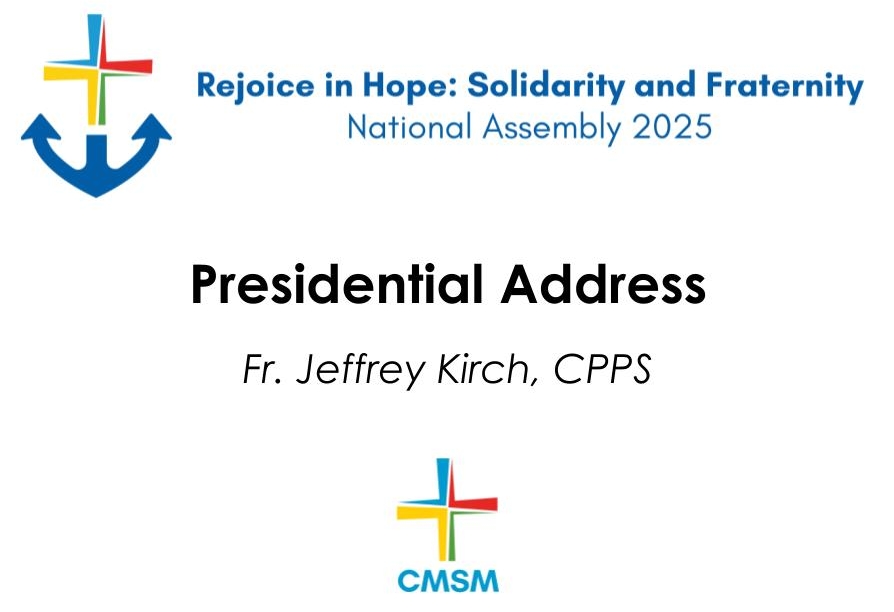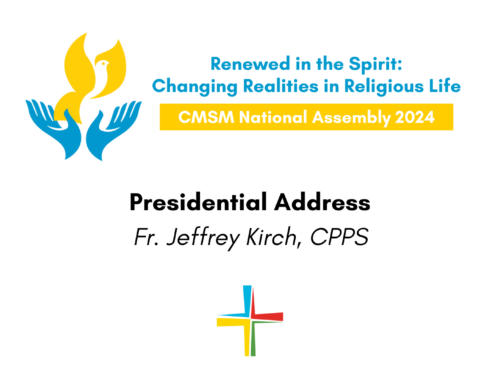Review for Religious is pleased to publish a copy of the Very Rev. Jeffrey S. Kirch, C.PP.S.’s Presidential Address to the 2025 Assembly of the Conference of Major Superiors of Men. In this final address as president, Fr. Kirch reflects on the Assembly theme Rejoice in Hope: Solidarity and Fraternity. He invites leaders to embrace joy and hope even amid difficulty, and highlights solidarity and fraternity as vital dimensions of leadership in religious life. Drawing from Vatican II and Pope Francis’ Fratelli Tutti, he urges communities to resist turning inward, remain faithful to their charisms, and reimagine their mission in new and creative ways.
Click here to download a copy of the essay.
Good morning and welcome to the 2025 Assembly of the Conference of Major Superiors of Men. On behalf of the CMSM Board I want to thank you for taking time out of your busy schedules to gather here in Baltimore to share community and reflect on our shared mission as leaders in Religious Life. It is my hope that these next few days will be days of renewal and a rekindling of fraternal bonds.
Our theme this year is Rejoice in Hope: Solidarity and Fraternity. Over the next few days we will be exploring these concepts from a variety of vantage points. The four words that make up our theme are rich in meaning. There is not a single manner in which they are to be understood. This gives each of us an opportunity to mine the richness in the words and to see how you as individuals can encounter them in your ministry of leadership.
I will attempt offer a brief reflection on our four subjects: Rejoice, Hope, Solidarity, and Fraternity. This will be done through the lens of leadership in Religious Life. My goal is to help us situate our role as leaders within the broader context of Religious Life in the United States and to offer some avenues moving forward that will make us more effective in our mission. I will begin with a reflection on the first half of the theme, Rejoice in Hope, which I will argue offers us an avenue forward as we journey through a world in which rejoicing is difficult. Then, I will turn to Solidarity and Fraternity which I identify as two essential qualities for our lives as religious, especially as leaders. Let us first reflect on the first half of our theme: Rejoice in Hope.
Rejoice in Hope
Many people in our world find it difficult to rejoice. Reading the newspaper or watching the evening news, we are bombarded with the difficulties which people encounter on a daily basis. Whether caused by the economy, or mother nature, or government policies, many of our brothers and sisters find themselves in a precarious situation. They don’t know if they can put a meal on the table. They don’t know if their son was detained by ICE. They wake up each day with a profound sense of grief at the loss of their young daughter in a flash flood. For many of us, it is hard to rejoice in this life. It is difficult to hold on to hope.
While on a different scale, we too, as leaders in Religious Life, can find it difficult to rejoice. We struggle to hold on to that hope which we are called to. A few years ago CMSM commissioned CARA to undertake a study on the issues facing leaders in men’s religious communities. The three top challenges that were identified were: 1) diminishing numbers; 2) aging population; and 3) excessive workload. I am sure that most of us in this room can relate to each of these concerns. These three challenges affect the life of our communities in distinct ways.
As some communities diminish in size, we are faced with the challenge of relinquishing apostolates which are at the heart of our mission. We no longer have the ability to staff our ministries as we had in the past. This leads to fewer opportunities to interact with the People of God and we are no longer able to share our charism with as many people. Fewer interactions lead to people not encountering our community which makes it more difficult to attract vocations. It becomes a self-fulfilling prophecy.
Couple this diminishment in ministerial opportunities with an aging membership and the challenge to religious life gets even more difficult. When the vast majority of a religious community’s membership is in their 70s and 80s, how attractive is that to a young man discerning a call to religious life?
And finally, as leaders, we are asked to ensure the health and vitality of our communities, yet we find ourselves burdened with administrative tasks which are necessary, but rarely life-giving. Adding all of this together, at times it is hard to rejoice. Let alone hold on to hope.
As leaders, how do we overcome these challenges? For most of us, we will not suddenly have twenty-five inquirers join our formation program this summer. None of us are going to grow younger overnight. And the administrative tasks are only going to increase in the future. The key is not to get mired in the despair that so easily holds us back.
I want to offer three small ways that might be beneficial for us in today’s environment. These three strategies are not complicated or even all that remarkable, but I believe they offer us a path forward through a world marked at times by despair, to a place of rejoicing. First, as leaders, we must celebrate the small victories. For many of us, our communities no longer can brag about the number of high schools we staff, or extensive network of ministries across the country that we sponsor. But we can hold up the small ways in which our mission is fulfilled. It might be the weekend food pantry at our parish that the province supports with a financial donation each month. It might be celebrating Bro. Smith’s 50th anniversary of profession. By celebrating the small victories we come to understand that God is still working through us.
This leads to the second small strategy that prevents us from getting mired in despair. We must continually remind ourselves that God is in control. While we certainly have agency in the life of our community, ultimately God is in control. We have the tendency to forget this. When we are not successful in some part of life in community, when a strategic plan fails, when it looks like nothing is going right, we must remember that in the end, everything is in God’s hand. If we remember that God is in control, then we have the ability to move forward in faith no matter what failures we might experience. Recognizing that God is in control gives us the ability to live in Hope. It is simply the paschal mystery. Through death, comes new life.
And this is the third simple strategy, we must find new ways share our charism. As the old ways have passed away, what are the new ways that God is calling us to. We might be smaller in number, we might be older in age, we might be burdened to too much work, but how is God calling on us in our present situation to new life? From my point of view, this is the most difficult thing to do. We are hard wired to rely on the age-old advice of: This is how we have always done it. Well, that may be, but we can no longer do it. As leaders we must dream up new ways of living our mission.
The call to Rejoice in Hope is at the center of our lives as leaders in Religious Life. Our call is to help our brothers in community not get mired in the despair that all too easily creeps in as our world and our communities change. We must offer them a vision of the future in which though situations are different, our faithfulness to the charism gifted to each of our communities from the Holy Spirit is strong. This leads to the second part of our theme, Solidarity and Fraternity. So now let us briefly turn to these two important theological concepts and explore how they offer us, especially as leaders, tools to ensure we are effective in our mission.
Solidarity and Fraternity
As demonstrated in the CARA survey, our lives as religious leaders, and by extension, all religious in some ways, has been marked by excessive workloads. More is being asked of fewer people. While it seems counter intuitive, as communities grow smaller, often the workload increases for leaders. Our horizon begins to shift from building the kingdom, to making sure the building doesn’t crumble. This is true with our communities as a whole as well. There is a tendency to turn inward and expend our energy on bolstering the institution. Our time ends up devoted to internal issues such as retirement costs, annual retreats, problem-some members who are also on the Council’s agenda, and other issues. There is no doubt that these are important tasks and issues to be dealt with. But the danger is that they end up encompassing the totality of our time and energy and we lose an important aspect of Religious Life: Mission.
Paragraph 43 introduces the chapter on Religious in Lumen Gentium. The Council Fathers connected those who observe the evangelical counsels, and by extension all forms of religious life, to the salvific mission of the Church. Religious Life offers a unique way to contribute to the mission of the Church. The key here is that while religious life is set within the broader universal call to holiness, religious life also has the character of uniquely embodying the mission that Christ has been given by the Father. All religious life, contemplative and active, is orientated to mission in the world.
Paragraph 46 goes further and argues that the evangelical counsels, no matter what form their observance takes, does not separate religious from the rest of humanity, but instead binds religious ever more intimately with humanity. The paragraph reads,
Let no one think that religious have become strangers to their fellowmen or useless citizens of this earthly city by their consecration. For even though it sometimes happens that religious do not directly mingle with their contemporaries, yet in a more profound sense these same religious are united with them in the heart of Christ and spiritually cooperate with them. In this way the building up of the earthly city may have its foundation in the Lord and may tend toward Him, lest perhaps those who build this city shall have labored in vain.
Religious, from monastics to societies of apostolic life, are called to be in solidarity with the whole human family. This call to solidarity is a potent remedy for our tendency to lapse into navel-gazing. This is especially true for us leaders who are often not in active ministry outside of our leadership roles.
Solidarity binds the Body of Christ together in such a way that each of us, no matter our state in life, should be concerned with the migrant searching for a better life for her children, and with the father who lost his job, and with the elderly person abandoned in their old age. Solidarity with a grieving earth helps all of us understand how the decisions we make, affect the poorest among us. Gaudium et Spes paragraph one, probably the most famous paragraph from the Council, expresses this most emphatically.
The joys and the hopes, the griefs and the anxieties of the men of this age, especially those who are poor or in any way afflicted, these are the joys and hopes, the griefs and anxieties of the followers of Christ. Indeed, nothing genuinely human fails to raise an echo in their hearts. For theirs is a community composed of men. United in Christ, they are led by the Holy Spirit in their journey to the Kingdom of their Father and they have welcomed the news of salvation which is meant for every man. That is why this community realizes that it is truly linked with mankind and its history by the deepest of bonds. GS 1
Solidarity is a key component of Catholic Social Teaching that forces us to reorientate our field of vision from the internal to the external. Pope Francis offer a profound reflection on solidarity in his encyclical Fratelli Tutti. Paragraph 115 reads,
At a time when everything seems to disintegrate and lose consistency, it is good for us to appeal to the “solidity” born of the consciousness that we are responsible for the fragility of others as we strive to build a common future. Solidarity finds concrete expression in service, which can take a variety of forms in an effort to care for others. And service in great part means “caring for vulnerability, for the vulnerable members of our families, our society, our people”. In offering such service, individuals learn to “set aside their own wishes and desires, their pursuit of power, before the concrete gaze of those who are most vulnerable… Service always looks to their faces, touches their flesh, senses their closeness and even, in some cases, ‘suffers’ that closeness and tries to help them. Service is never ideological, for we do not serve ideas, we serve people. FT 115
Each of our charisms, if they are truly from the Spirit, must spur us on to unite with the whole of humanity and so what happens to the least of my brothers and sisters is our concern. Solidarity helps us as leaders stay focused on the deeper call of mission. If I can understand in my heart, that what I do when I’m sitting at my desk reviewing budgets for the province is in some way united with the broader mission of my community, if I can see that my ministry of leadership and administration deepens the bonds of solidarity with the Body of Christ, then in some ways, I am fulfilling the call to mission.
The fourth word from our theme that I would like to briefly reflect on is fraternity. Like solidarity, fraternity is ripe with an abundance of meaning for religious life. There are certain shared traits between solidarity and fraternity, yet their orientation differs. This difference enriches our experience. If solidarity is a remedy for an excessive concentration on the internal life of community to the detriment of our suffering brothers and sisters, fraternity is a remedy for our tendency to act as individuals and forget that we are part of something greater, a community of brothers called by Christ to mission.
Pope Francis reflects on the notion of fraternity in his encyclical Fratelli Tutti. He writes in paragraph 88, “In the depths of every heart, love creates bonds and expands existence, for it draws people out of themselves and towards others. Since we were made for love, in each one of us “a law of ekstasis” seems to operate: “the lover ‘goes outside’ the self to find a fuller existence in another”. For this reason, “man always has to take up the challenge of moving beyond himself”. It is no coincidence that Francis sees fraternity in trinitarian terms.
The call of fraternity is a call out of my individualism into a relationship with others that broadens my horizons and fulfills the wish of God. Fraternity here on earth in a foretaste of that union with God that we seek. In religious life, fraternity reminds me that I am part of something larger than my own desires and wishes. Something more significant than my own concerns and cares. Fraternity reinforces that I am part of community that is growing in love.
As leaders, it is our responsibility to form our members in this fraternity. As we all know there are divisions within each of our communities. We are not immune from polarization, whether it is politically, liturgically, or ecclesiologically. Fraternity is an antidote to that polarization. At times, differences in age or formation experience can stress the bonds of community. If we can see beyond the differences and experience the deeper connections we have with one another in our fraternal life together, then we will more faithfully live out the call of religious life.
Conclusion
As my final presidential address comes to a close, I hope these words have sparked something for you to reflect on. Throughout the remainder of the week, we will engage with the concepts of hope, solidarity, and fraternity.
In going back and reviewing my past addresses, it has become clear to me that religious life in the United States has a future. Ultimately that future depends on God, however, we have a role as well. To be faithful to our call, some things must change. Yet, to be faithful also means that some things must not change. In my first address I stressed the importance of Charism. No matter what changes around us, we must stay faithful to our Charism that has been entrusted to us by the Holy Spirit through our Holy Founders.
I argued in last year’s address, that while we must be faithful to our charism, we must also undergo a seismic change due to the changing realities we are facing. The Church and world are different than they were in 1965. Our structures, institutions, way of doing mission, and way of being religious will need to undergo a deep renewal that will not be easy.
Today, I have highlighted the theological concepts of solidarity and fraternity which are essential tools for us in our ministry of leadership. Solidarity and fraternity guard against the tendencies of the turn inward and the turn to individualism in religious life. Both solidarity and fraternity are necessary to ensure our charisms and religious life thrives in the future.
It has been my honor over the past three years to serve as your president. Later this week we will welcome Fr. James Herring as the new president. I am looking forward to working with him to serve you. I also want to give special thanks to Fr. Frank Donio. He has been invaluable to me in his role as executive director. Everything that happens at CMSM happens due to his hard work and dedication. Finally, a thanks to all of you for your faithful service to your brothers in community and to the wider church. It is your commitment to the mission of Christ gives hope to the world.






